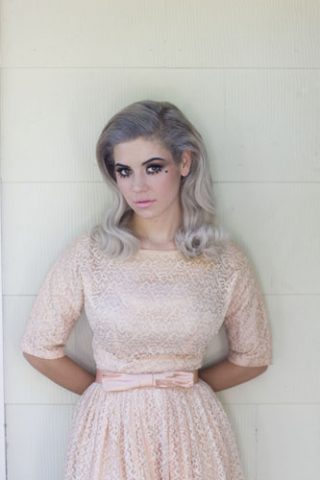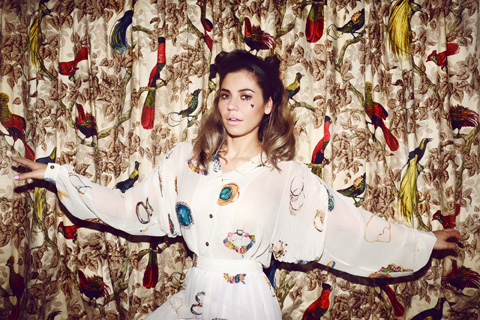With that trademark heart on her cheek and songs that boom with chirpy beats, Marina Diamandis (a.k.a. Marina and the Diamonds) appears to have walked out of a Saturday morning cartoon. Except she’s not that innocent.
The persona the Welsh-born Londoner presents with Electra Heart, the follow-up to her debut, The Family Jewels, is a prissy, sinfully sexual diva who aspires to be a “bottle blonde.”
In our interview, Marina and the Diamonds chatted about how the character has more to do with her than you think, being the “only gay in the village” and not talking about the dirty title pun of her first album…until now.
I don’t know if you’ve heard, but some of your fans are gay.
[Laughs] About 97 percent of my shows’ audience! It’s so fantastic. Truthfully, I’d say 60 percent gay, 40 percent teen girls. And 2 percent 50-year-old creepy man in the back!
When did your relationship start with the gay audience?
On the first album I definitely did have a gay fan base, but it was much smaller, because I’m a very flamboyant character and the shows are really theatrical. But I don’t really talk about the whole gay community thing, because I don’t want to be a cliché pop star saying like, “I love my gays!” But the truth is it’s a really supportive fan base and they’re making this tour so special.
How about just going the bisexual route?
That’s on the way! [Laughs]
What was the gay scene like where you’re from in Wales?
Are you joking? I lived in a village of 200 people! I didn’t really see any kind of gay scene until I moved to London when I was 19. I was the only gay in the village!
You’ve said that you relate to your gay fans, and obviously they relate back to you. Can you talk about that?
I think it’s part of the camp nature of my first [album], but I think with this album in particular, it lends itself to that more. On a lyrical level, with the first album I wrote a lot about feeling like an outsider and like I wasn’t accepted for who I was, and that upset me very much – so perhaps that’s why. If you’ve dealt with discrimination in your life, you probably really connect to some of those feelings. Also, on this album, a lot of the humor has really caught the gay community’s attention. You’re very humorous.
As far as the whole cartoon-like persona goes, do you think your gay audience appreciates your flamboyant look and fashion more than your mainstream audience?
No, but gay people pick up on things a little bit quicker and sense stuff that is potentially underground or quite cultish and is going to become bigger before a mainstream audience will. But everyone likes a pretty picture.
What was your reaction to seeing Cazwell and Amanda Lepore do a video for “Primadonna”?
Oh my god, I died! I love Amanda Lepore so much. I was just like, “Is this real?”—because Amanda Lepore really isn’t real, obviously. I listen to her quite a lot. There’s a song called “Cotton Candy” and it’s just fantastic.
Have you seen a drag queen do one of your songs before?
I haven’t…yet.
What tips do you have for Marina drag queens?
You have to have gigantic roots, paint the heart on your face with some eyeliner and then cut a strip of lashes from MAC and put four on each lower lash. Then use a nice bubblegum pink lipstick.
Tell me you named the first album The Family Jewels because of the pun.
That was the sole reason for it. But I was so lily-white skinned that when I began I absolutely couldn’t admit it to the press in case my family heard or my dad heard and thought, “How rude! You can’t be making those dirty puns.” So I never really explained the meaning of it, but I just liked that my album title was basically bollocks.
After the first album was released, you admitted to being bummed that it didn’t live up to your expectations commercially. What were your expectations with The Family Jewels, and are you feeling more positive about Electra Heart?
Looking back on all of those interviews from that era, I look like I’m on the edge of a nervous breakdown. [Laughs] So I think that might have influenced my promotional duties at the time. I was really stuck in a rut, and I think I was ambitiously disappointed.
It wasn’t that it didn’t do well. Looking back, I can’t actually believe that I sold that many records on an album that was pretty alternative except for two of the songs. I guess I am really ambitious and I want to be one of the greats – and there’s nothing wrong with being honest about that. With this album, I didn’t really have any of those expectations. I’ve let go of a lot of that baggage while writing the album. I’ve just changed my perspective completely.
When did you realize that you wanted to be famous?
I didn’t really interpret it in that way. At 9 or 10 years old, I knew from the bottom of my heart I was going to be an entertainer, in that I wanted to perform in some way – but I didn’t really know if I would be dancer or an actress. I definitely didn’t really think about being a singer until I was 15, and then I knew what I was going to do with my life.
Fame and the media’s effect on us come up a lot in your songs. Why are you so interested in exploring those topics?
To be honest, it’s less about fame and more about praise and performance. If you look at all of the lyrical themes that are connected with that subject, it’s more about theatrical terms – like primadonna or the starring role in theater – so it’s not about being famous or being known. It’s more about feeling like you’re No. 1.
I was in a relationship where I felt like I was second best and I just thought, ‘I’m not going to stick around.’ I was completely in love with him, but I just walked away. You’re the only person who can look out for you, and no one should really settle for second best. It almost seems like it’s an obnoxious thing to say for some reason. But I don’t think it is.
Who inspired “Teen Idle”? Did you have any one in mind for that song or the rest of the album?
There’s a bit of Brit-Brit on the album. I mean, “Bubblegum Bitch” is basically Britney Spears peeled inside out. Britney is our teen idol, so that’s what we all relate that term with. It’s just so strange how everyone relates to that song (“Teen Idle”) – that’s been the biggest shock of the album, and I’m so happy about that.
You didn’t expect that?
No, I just thought the lyrics were too specific and obscure. But that’s the nicest surprise as a writer sometimes, when people come to you and you realize that everyone just goes through the same shit in one way or another.
You were looking to Marilyn Monroe and Marie Antoinette for this album, too. How did they work into it?
That was more of a visual thing. I’ve been looking for people who have always been portrayed with a certain duality to them in public. I’m really interested in that for some reason. I think villains are interesting. I wanted Electra Heart to have a villainous side to her.
Electra Heart is an alter ego?
I don’t know. I always think “alter ego” means something completely different. I think it’s a character that I formulated in order to be able to talk about things that I was too embarrassed to talk about.
How much of that character is actually you?
Quite a lot. It has to be. If you made it, then it’s real. If you’ve created it, it has to come from somewhere. I think people make stories up, but it has to evolve from some truth somewhere along the lines. It’s just like “Primadonna” – there are parts of my personality that are like that. I am kind of precocious, but it’s not exactly something that you would market yourself as being, because it’s not a very likable character. Maybe Electra Heart allows me to act or to write in a certain way and to write about universal truths.
Without seeming too narcissistic?
Exactly. Because “Primadonna” is a fun song, and people see the irony in it but also the truth: that we all know sometimes we can be like that or we know someone who can be.
Is Electra Heart more sexually adventurous than you? Would she have a lesbian encounter?
[Laughs] No, I don’t think she would. But I do portray her as a bit slutty, and I don’t really know why! Maybe I’m trying to live through her because I’ve never been one-night stand-y or anything. I’m a stage mom trying to live through her daughter.
Chris Azzopardi is the editor of Q Syndicate, the international LGBT wire service. Reach him via his website at www.chris-azzopardi.com.



What Do You Think?